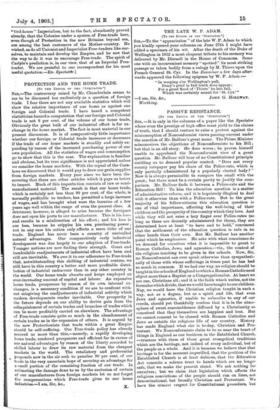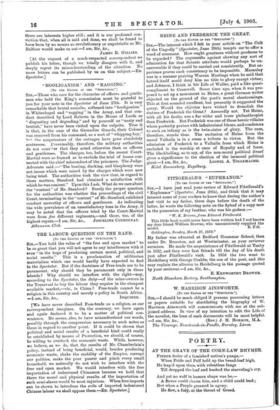PASSIVE RESISTANCE.
[To THE EDITOR OF THE 'SPECTATOR."] SIR, —It is only in the columns of a paper like the Spectator where even the prestige of high office must yield to the claims of truth, that I should venture to raise a protest against the misconception of Nonconformist views passing current under the sanction of Mr. Balfour's great name. The Prime Minister misconceives the objections of Nonconformists to his Bill ; but that is an old story. He does worse ; he proves himself unable to apprehend the Nonconformist view of a great question. Mr. Balfour will hear of no Constitutional principle entitling us to demand popular control. "Does not every county ratepayer pay his share of the Police-rate, which is only partially administered by a popularly elected body ? " Now it is always permissible to compare the small with the great ; but there must be a certain parity to justify the com- parison. Mr. Balfour finds it between a Police-rate and the Education Bill ! To him the education question is a matter of administrative reform, and it is hopelessly illogical to deal with it otherwise than with a Police-rate. But to the great majority of his fellow-citizens this education question is one of vital importance, affecting the well-being of their children and the prosperity of the country which they love. And while they will not raise a lazy finger over Police-rates (so long as these are decently administered for them), they are determined here at least "to have and to hold," convinced that the settlement of the education question is safe in no other hands than their own. But Mr. Balfour has another point which he emphasises. He asks with what conscience do we demand for ourselves what it is impossible to grant to Roman Catholics, Jews, and agnostics,—viz., the control of the religious teaching to be given in the schools. Now, Sir, no Nonconformist can ever speak otherwise than sympatheti- cally of those with whose sufferings In times past he has had so much in common. If we had our way, no religion should be taught in the schools of England to which a Roman Catholics need object more than a Baptist or a Congregationalist. At heart we are one, Christians all; and it is the faith which unites, not the formulas which divide, that we would have taught to our children. Nay, we would have the Christian religion taught in such a way, not as a dogma, but as a spirit and life, that even Jews and agnostics, if unable to subscribe to any of our creeds, should yet thankfully confess that it is in the atmo- sphere of sweet reasonableness diffused by a Christianity so conceived that they themselves are happiest and best. But we cannot consent to be classed with Roman Catholics and Jews as outside the religious life of our country. History has made England what she is to-day, Christian and Pro- testant. We Nonconformists claim to be as near the heart of things in England as our brethren in the Established Church, —trustees with them of those great evangelical traditions which are the heritage, not indeed of every individual, but of the people as a whole. And it is because we believe that that heritage is for the moment imperilled, that the position of the Established Church is at least dubious, that the Education Act commits a solemn trust to hands which are no longer safe, that we make the present stand. We ask nothing for ourselves; but we claim that legislation which affects the religious convictions of the people should run on lines, not denominational, but broadly Christian and Protestant. We have the utmost respect for Constitutional procedure, but
there are interests higher still; and it is our profound con- viction that, when all is said and done, we shall be found to have been by no means so revolutionary or unpatriotic as Mr. Balfour would make us out.—I am, Sir, Sze., JAMES R. GILLizs.
[At the request of a much-respected correspondent we publish his letter, though we totally disagree with it, and deeply regret its misunderstanding of the situation. No more letters can be published by us on this subject.—En. Spectator.]











































 Previous page
Previous page